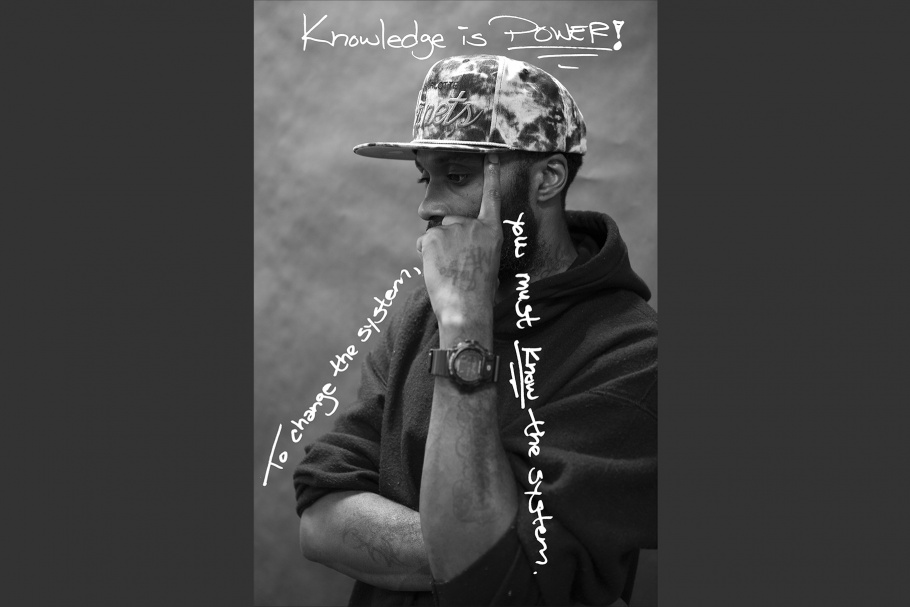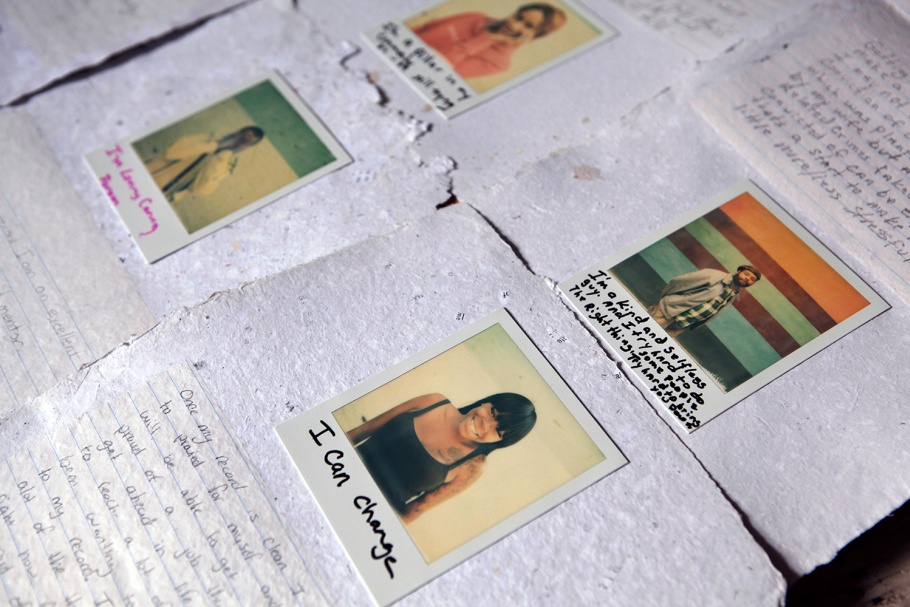20171001-reentry-mw24-collection-001

"Knowledge Is Power" protest sign, from the project What Do You Need to Stay Free?, 2016–2017.
During Reentry Think Tank workshops, Think Tank fellows create photographs in response to the question, "What do you need to stay free?" This image is one of many photographs from that project that have been reproduced as large banners and protest signs for traveling exhibits and demonstrations at venues such as community legal clinics, law libraries, Philadelphia’s City Hall, and federal detention centers. They have also been printed and hung in strategic locations across Philadelphia, such as the Public Defender’s office and the Mayor’s Office of Reintegrative Services, where they are used to help engage with their clients. In early 2018, these protest signs will be carried as part of a march to Philadelphia’s City Hall, where the Reentry Think Tank’s Reentry Bill of Rights will be presented to policy makers as a gift, form of protest, and conversation starter.
20171001-reentry-mw24-collection-002

Polaroid photographs and hand-written text on handmade paper made from pulped criminal records, from the project “Without my criminal record, I am … ,” 2014–2017.
In 2014, the People’s Paper Co-op—a program of The Village of Arts and Humanities in Philadelphia—connected formerly incarcerated individuals with the Philadelphia Lawyers for Social Equity to co-design a series of arts-integrated legal clinics. Lawyers worked with each clinic participant to begin the process of clearing or cleaning up their criminal records. Participants then worked with People’s Paper Co-op Fellows to tear up their criminal records, put them in blenders, and use the pulp to create new blank sheets of handmade paper. Participants then added writing and a Polaroid portrait onto the handmade paper. This growing collection of “quilt sheets” have been exhibited in places such as legal clinics, Philadelphia City Hall, churches, and museums.
Reentry Think Tank is a project founded by artists Courtney Bowles (American, b. 1974) and Mark Strandquist (American, b. 1985) in 2016, with support from the A Blade of Grass Fellowship for Socially Engaged Art.
Reentry Think Tank is a collective of advocates—all who have experienced incarceration—that works to re-design services and policies to benefit people re-entering society after incarceration. The collective consists of: Hiram Adams, James Baker, Faith Bartley, Deanna Bell, Josette Bennett, Russell Craig, Aaron Crump, Alphonso Dashiell, Joshua Glenn, Anthony Hirschbuhl, David Jackson, Anthony Lovett, Sheila Michael, Tarrence Swartz, Colwin Williams, and Romeeka Williams. The think tank is part of the artists’ ongoing commitment to using art to connect, amplify, celebrate, and power social justice movements.
At the core of their artistic practice is the belief that those most impacted by the criminal justice system possess the expertise needed in order to create change on personal and systemic levels. The Open Society Moving Walls Grant will support the expansion of the Reentry Think Tank project.
Reentry Think Tank
“These records hold us back, they hold us down. Like a tail, they keep tripping us up; as we try to move our lives forward, they come back to haunt us.” —Karon, 28, project participant
All photographs tell stories, but a mugshot, like a criminal record, stigmatizes and repeats the same story about a person, regardless of what happens before or after an arrest is made. In the United States, over 70 million people have criminal records. These records disproportionately impact communities of color and create obstacles to employment, housing, education, health care, and social mobility.
The Reentry Think Tank transforms not only which stories are told, but also who tells them. Artists Courtney Bowles and Mark Strandquist founded the think tank in 2016 as a platform for its fellows—all advocates from Philadelphia who have experienced incarceration—to work with photographers, civil rights attorneys, and other community experts to transform the stereotypes, social services, and policies that impact their lives.
One aspect of the project includes free arts-integrated legal clinics organized by legal aid organizations and the Reentry Think Tank. At these clinics, lawyers expunge participants’ criminal records, and think tank fellows facilitate symbolic acts of creative resistance where participants tear up and pulp their records to create fresh, blank sheets of handmade paper.
This exhibition features Reentry Think Tank artwork and powerful testaments of transformation that have been exhibited and used as advocacy tools in federal detention centers, city streets, galleries, church basements, and Philadelphia City Hall.
—Reentry Think Tank, October 2017